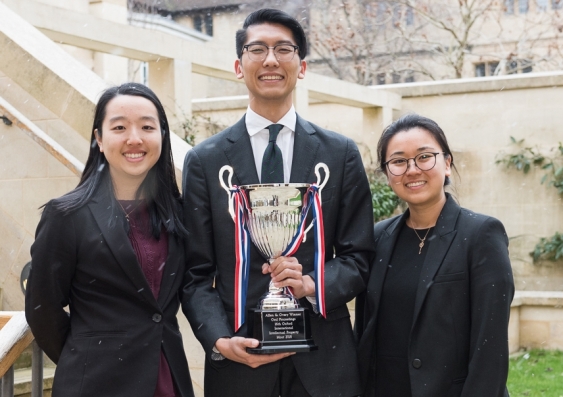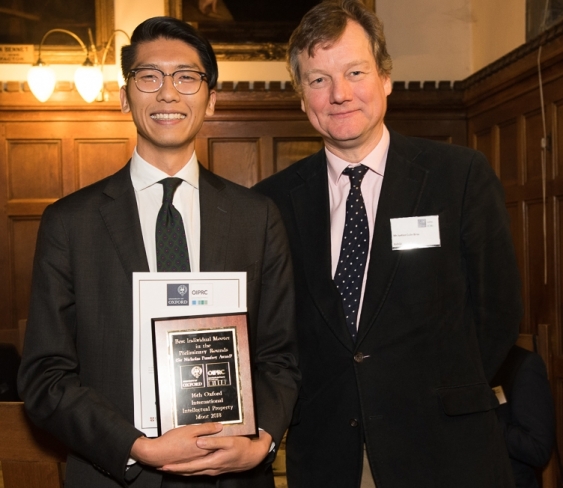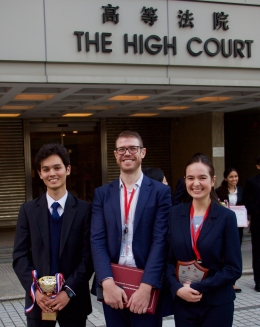Cockatoos and conflict: UNSW Law students enjoy mooting success
UNSW Law students have shone at prestigious international mooting competitions in Oxford and Hong Kong.
UNSW Law students have shone at prestigious international mooting competitions in Oxford and Hong Kong.

Clare Morgan
UNSW Media & Content
(02) 9385 8920
clare.morgan@unsw.edu.au
UNSW Law students have shone at two international mooting competitions, taking first place in the 16th Oxford International Intellectual Property Law Moot and runner-up in the 16th Red Cross International Humanitarian Law Moot in Hong Kong.
The Oxford IP Moot is regarded as one of the world’s most prestigious intellectual property law mooting competitions and attracts applications from law schools around the world. Participation in the oral rounds is by invitation only, based on teams’ written submissions.
Out of 66 written submissions for the 2018 competition, 28 universities from Australia, Canada, China including Hong Kong, France, Germany, India, Malaysia, Singapore, Switzerland, the United Kingdom and the United States were invited to compete in the oral rounds – the largest number of teams in the competition’s history.
The moot focused on issues in copyright law and performers’ rights, in a case involving a fireworks display and a trio of performing cockatoos. Teams had to address questions in relation to the meaning of “dramatic work”, the test for authorship, assessment of non-literal infringement, and whether an animal-only presentation can constitute a performance.
The UNSW team of Christina Han, Anne Wang and Wee-An Tan went through the preliminary round undefeated, beating King's College London, the National University of Singapore, Multimedia University and the National Academy of Legal Studies and Research, India. The team faced Bucerius Law School (champions of the 2017 competition) in the quarter-finals and University of Ottawa in the semi-finals.

Wee-An Tan receives the Sir Nicholas Pumfrey Award for the Best Individual Mooter in the Preliminary Rounds, presented by Mr Justice Birss. Photo: Edmund Blok
The grand final was held between UNSW and the University of Cambridge, and judged by Lord Justice Kitchin of the Court of Appeal of England and Wales, and Mr Justice Henry Carr and Mr Justice Colin Birss of the High Court of Justice of England and Wales. The judges awarded the UNSW team the Allen & Overy Prize for winning the oral proceedings.
The UNSW team also received the Powell Gilbert Prize (third place) for Best Written Submissions (out of 66 universities), and Wee-An Tan received the Sir Nicholas Pumfrey Award for the Best Individual Mooter in the Preliminary Rounds.
As part of their prize, the team met with David Stone (Partner, Allen & Overy LLP London, and Deputy High Court Judge in England and Wales) for a mentoring lunch at Allen & Overy’s Sydney offices.
Team member Christina Han said: “It was an enormous honour to be part of this competition. We really want to thank our coaches, UNSW alumni Ashna Taneja and Sumer Dayal, and the academics, alumni and practitioners who volunteered to judge our practice moots.”
The International Humanitarian Law Moot in Hong Kong is organised by the Hong Kong Red Cross and International Committee of the Red Cross in collaboration with the University of Hong Kong and the Chinese University of Hong Kong.
Cases focus on war crimes and crimes against humanity, and this year’s case revolved around an escalating conflict between two fictitious neighbouring countries.
To compete in the moot, universities must have won their national qualifying rounds. As champions of the 2017 ALSA International Humanitarian Law Moot, UNSW secured an invitation and was generously sponsored by the Australian Red Cross.
In 2018, 24 universities from around the world were invited to take part in the competition, held at the University of Hong Kong and the Hong Kong High Court.

Coach Samuel Hartridge, centre, with UNSW Law students Christopher Chiam and Veronica Sebesfi in Hong Kong. Photo: Supplied
After defeating teams from Malaysia, The Philippines, Sri Lanka and Singapore, the UNSW team of Veronica Sebesfi and Christopher Chiam, coached by Samuel Hartridge, met Gujarat National Law University (India) in the grand final.
They were narrowly defeated in a split decision between the five eminent judges: Judge Liu Daqun of the United Nations’ International Criminal Tribunal for the former Yugoslavia (ICTY), International Criminal Tribunal for Rwanda (ICTR) and International Criminal Court (ICC); the Hon Mr Justice Patrick Chan of the Hong Kong Court of Final Appeal; Mr Amrith Rohan Perera, Permanent Representative of Sri Lanka to the United Nations; Mr Larry Maybee, ICRC Delegate to Armed and Security Forces for South East Asia and the Pacific; and Dr Michael Crowley, senior lecturer, Edith Cowan University.
Christopher Chiam received the prize for best speaker of the competition.
Team member Veronica Sebesfi said: “Chris and I found the moot was an incredible opportunity to represent UNSW on an international stage, to engage in-depth with a fascinating area of law, and to moot in front of highly respected judges. We’re immensely grateful to Samuel Hartridge for volunteering his time as our coach and to all those who judged practice moots to help us prepare.”